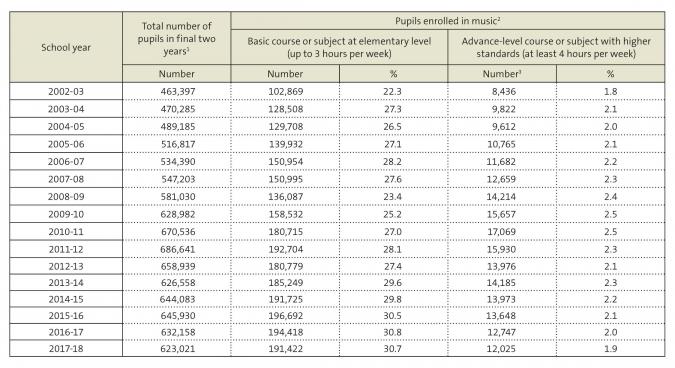In the 2017-18 school year, the state schools in Germany counted around 623,000 pupils in final two years of grammar school. According to the KMK, more than 191,000 of them chose music as basic course or subject at elementary level, which corresponds to a share of almost 31 %. In advance-level music courses or music subjects with higher standards the number of pupils was over 12,000 (1.9 %).

Note
The final two years of grammar school are qualification phases Q1 and Q2 for grammar schools with eight grade levels (G8), as well as grades 12 and 13 for those with nine grade levels (G9). To take into account the differing treatment of the final years of grammar school in Germany’s states, the Standing Conference of the Ministers of Education and Cultural Affairs (KMK) no longer speaks of ‘basic’ and ‘advanced’ courses, but of subjects with basic or higher standards (‘Vereinbarung zur Gestaltung der gymnasialen Oberstufe in der Sekundarstufe II’, KMK Resolution of 7 July 1972 in the version of 16 June 2016). At least two subjects with higher standards are mandatory in all states; a number of states have defined three or even four such subjects.
Footnotes
-
For grammar schools with eight grade levels (G8): Qualification phases Q1 and Q2. For those with nine grade levels (G9):
grades 12 and 13. -
Total number of pupils according to information supplied by the Federal Statistical Office. From the 2008-09 school year a distinction has been made between grammar schools with eight years (G8) and nine years (G9). The figures cover both G8 and G9 grammar schools as well as integrated comprehensive schools, Waldorf schools and special schools.
-
Number of pupils in the individual courses according to information supplied by the KMK. The figures include G8 and G9 grammar schools as well as integrated comprehensive schools, Waldorf schools and special schools.
-
Since the 2011-12 school year music has no longer been taught in Bavaria as a subject with higher standards.
Quelleninformationen
Secretariat of the Standing Conference of the Ministers of Education and Cultural Affairs of the Länder of the Federal Republic of Germany, and various annual issues of the Federal Statistical Office’s Subject series 11, series 1.



